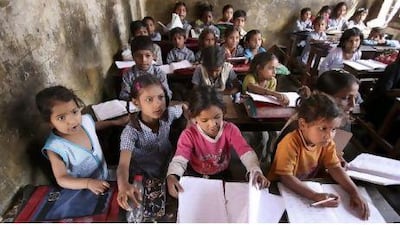NEW DELHI // A new proposal would make receiving an education up to the tenth grade in secondary school a fundamental right of every Indian child, extending the current guarantee of schooling for children between the ages of six and 14, or up to the eighth grade.
During a meeting of the Central Advisory Board of Education last week, Kapil Sibal, the minister of education, suggested that "every child in the country … must have the right to at least 10 years of formal schooling."
A committee of state ministers and educators is expected to submit a draft of the new proposal in three months.
A successful extension of the Right of Children to Free and Compulsory Education Act, popularly known as the RTE Act, could assist as many as 19 million children who would otherwise have dropped out of school around the eighth grade, according to India's Planning Commission.
The RTE Act was passed by the Indian parliament in August 2009 and came into effect the following April. But problems have dogged its implementation.
"To extend it now to the tenth grade", said K Satyanarayan, an independent education policy analyst in Chennai, "is very premature. It is like adding to the plate something that won't be bitten into for a long time."
The government's assessment of the first year of the RTE Act's operation has revealed concerns.
In April, when he released an RTE "report card", Mr Sibal said: "It's unfortunate that [8.1 million] children in the age group of six to 14 are still out of school. We have to bring all those children to school."
Mr Sibal added that one in five teachers were working without the requisite professional qualifications and that at least 500,000 more teachers were needed.
The Annual Status of Education Report, a survey of 13,021 schools initiated by Pratham, a network of non-governmental organisations that promote primary education for disadvantaged children, found that only 55.8 per cent of schools meet the pupil-teacher ratio prescribed by the RTE Act. Just over 70 per cent of schools can make drinking water available to their students.
Kiran Bhatty, the RTE commissioner, said: "It's true that one hasn't seen a lot of immediate change in the RTE Act's first year. But education systems in India are complex, and things need to be organised and reorganised. A lot of policy work has been done, and we've looked into the divisions between the central government and the states."
Primarily, several experts said, the RTE Act's lethargic start has been the result of tussles between the state and national government. Education is simultaneously under the purview of state and central governments, and although the RTE Act has been driven by the national government, the states are in charge of managing and monitoring its progress.
State governments continue to insist that they do not have the funds to carry out their work under the RTE Act. As of April, only 11 out of 28 states had formed the state commissions intended to monitor the act's progress. Last year, the funding required for the first five years of the RTE Act was estimated by the Indian government to be the equivalent of Dh188.4bn. State governments were expected to finance about 30 per cent of that figure.
Last April, as the act went into effect, Nitish Kumar, the chief minister of the state of Bihar, said the states "lack sufficient resources to implement the RTE Act". That concern was echoed by Mayawati, the chief minister of Uttar Pradesh.
Ms Bhatty called these complaints unfair. "Even before the RTE Act, the states were not spending all the money funnelled to them for education from the centre, and year after year, they would return money," she said. "So they can't complain about lack of funds. It's just that they need to get more organised."
One reason the states are chafing under the RTE Act is that they view its norms and standards as an imposition, said Yamini Aiyar, director of the Accountability Initiative at the Centre for Policy Research, a Delhi-based think tank. The act specifies, for instance, that schools must have playgrounds, specific pupil-teacher and teacher-classroom ratios, and boundary walls. "I think schools have to vary according to whether they're in a remote location or an urban location, what kind of community they serve, things like that," she said. "So if some states - like Himachal Pradesh or Bihar, for instance - are trying to choose indigenous solutions to problems, they may not be able to do that under the RTE Act."
Ms Bhatty insists that the act's norms are "fairly minimal and basic. The problem is that pretty much anything seems to go as a school right now, and we can't have that. It's true - in the middle of Mumbai, it may be difficult to have a playground in a school. But if state governments seem to be able to find land for malls and cinema multiplexes, they should be able to do it for schools as well."
On the ground, the changes effected by the RTE Act are only gradually becoming apparent, and it may take an experienced eye to spot them.
Ms Aiyar, who is working on primary education projects in seven districts across India, noted that "there is now a lot more focus on enrolling children, and some states are beginning to take the formation of school management committees more seriously".
During her travels, Ms Aiyar asks district-level officials their opinions about the RTE Act. "Generally, they'll begin by grumbling about how there are more norms and rules to follow now, and how their lives have been made more difficult," she said. "Immediately after that, they'll say the politically correct thing: 'Of course, it's good to have a right to education like this.'"

